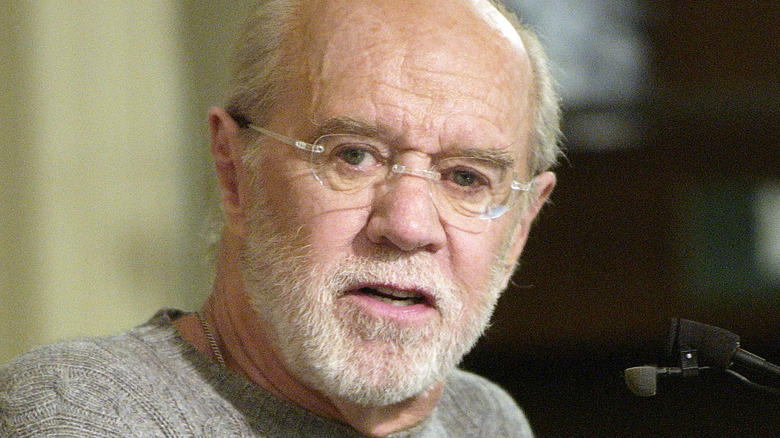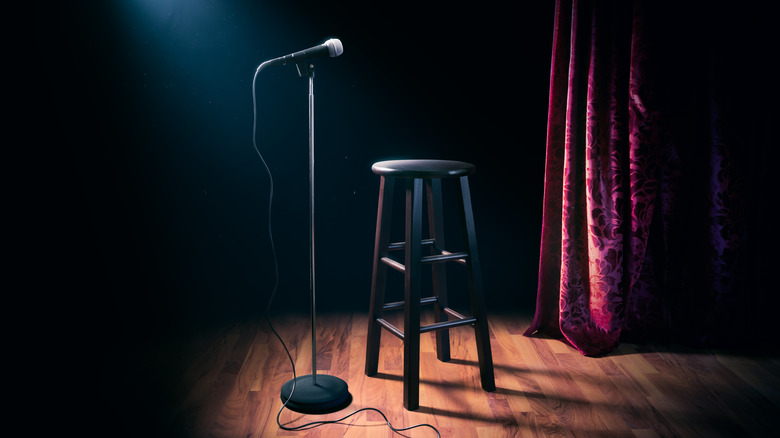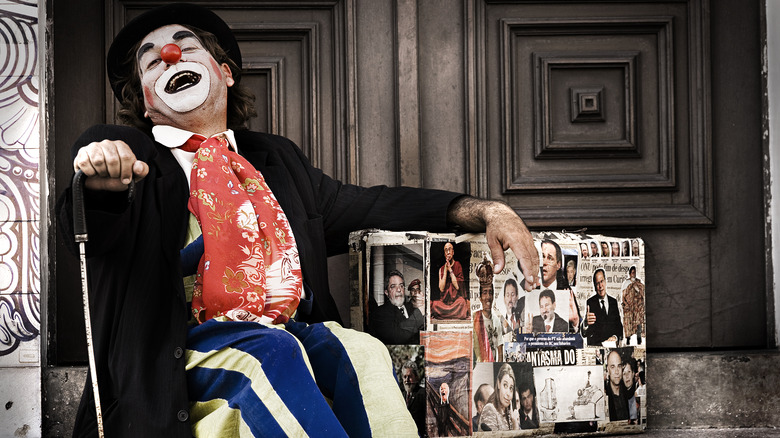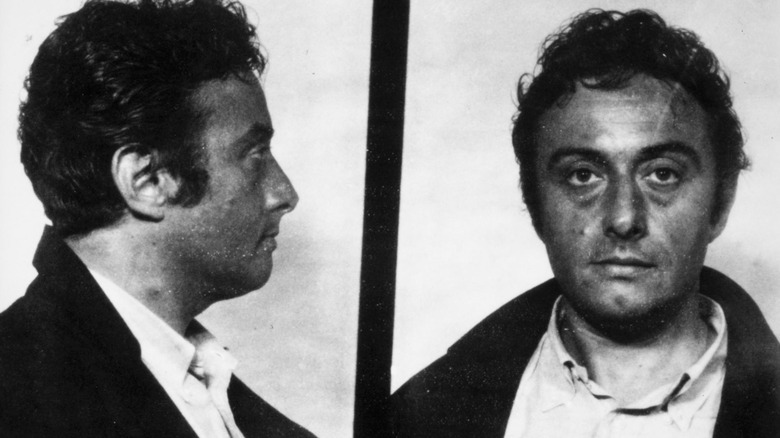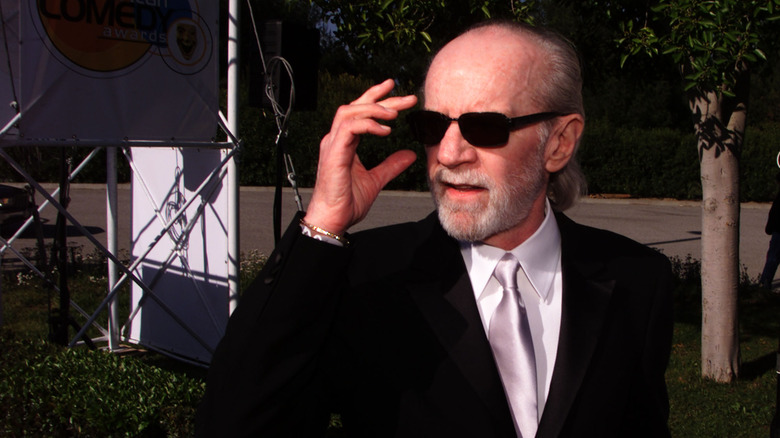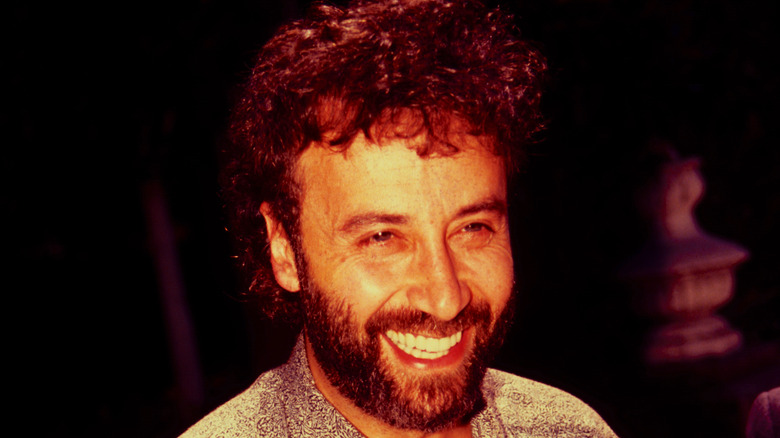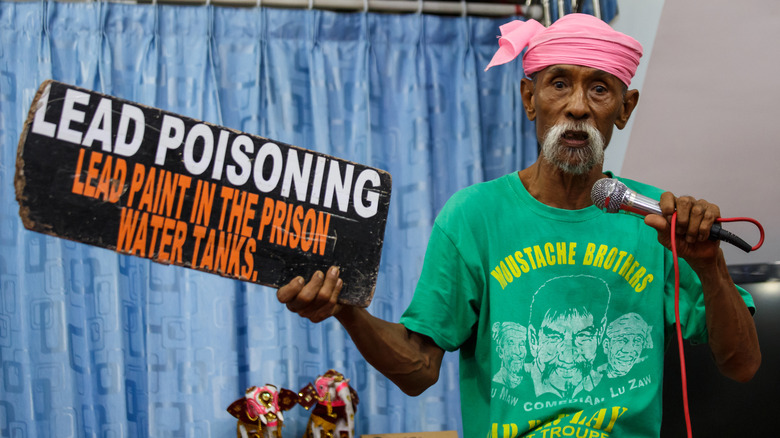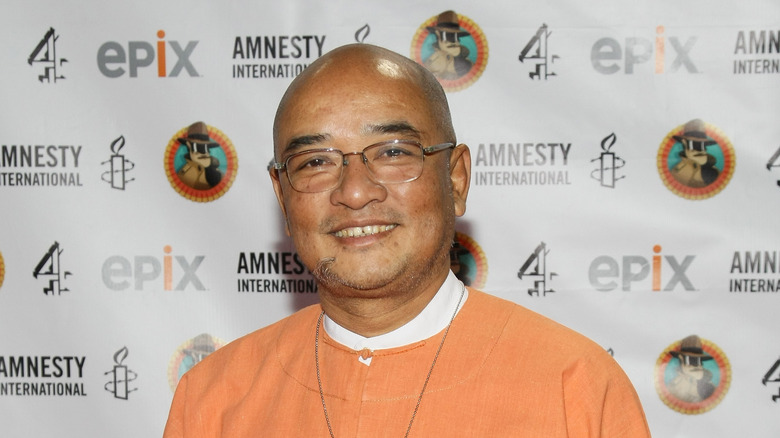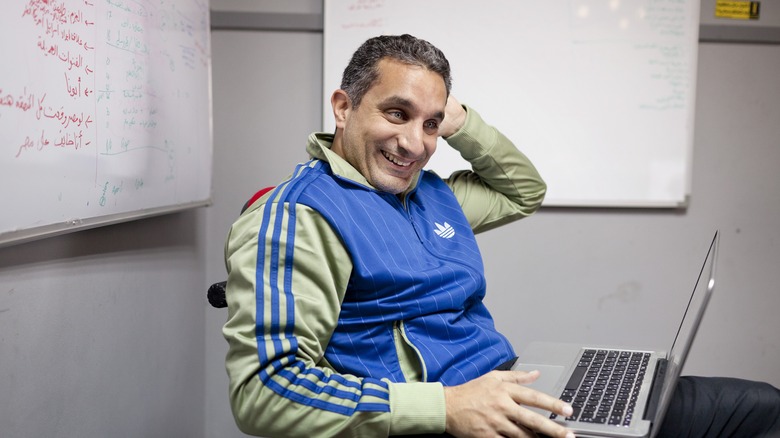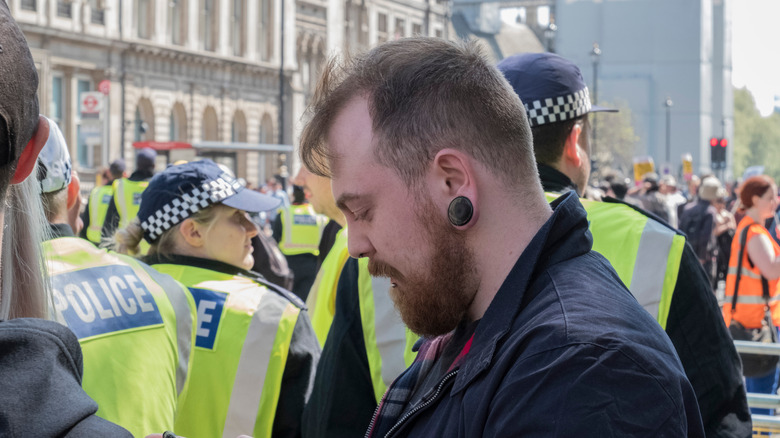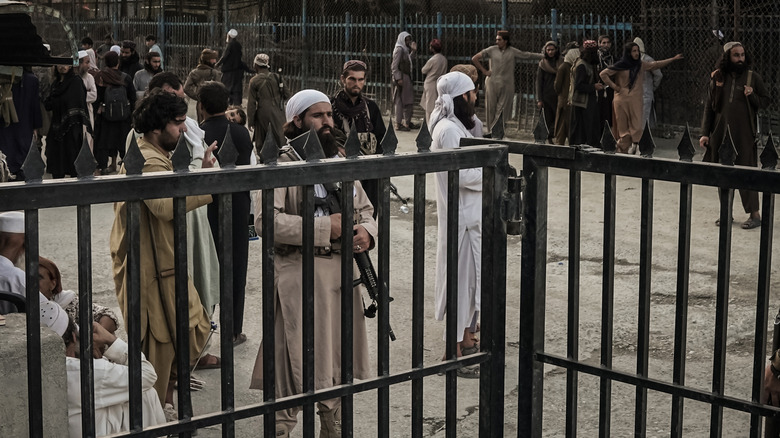Why These Comedians Got Arrested For Performing Their Act
"Dying is easy. Comedy is hard," goes the old saying (which is apparently difficult to source, according to Quote Investigator). Regardless of its provenance, this pithy statement reflects the wisdom of playwrights, authors, and poets since antiquity: Comedy can be no laughing matter. It's no secret that many of the medium's most talented performers epitomize the tortured artist trope, with some of comedy's greatest names succumbing to tragic ends.
The cards are frequently stacked against would-be comedians. In a 2020 piece for Vulture, comedian Roy Woods Jr. explained how up-and-coming comics now not only face the age-old challenges of poverty, exhaustion, ridicule, and harassment but also the new, more cautious realities of the coronavirus era. As if it wasn't hard enough writing and performing new material, comedians are also society's canary-in-the-censored-coalmine, and the consequences they face often reflect what the rest of us are or are not allowed to say. Comedians have frequently pushed the boundaries of acceptability, and very often, society pushes back.
An Indian comic who didn't even make a joke was sent to prison
India is the world's largest Hindu-majority country, but it also has the second-largest population in the world and a small Muslim minority of over 200 million people. And the two groups don't live in perfect harmony. "Since India's independence, Muslims have faced systematic discrimination, prejudice, and violence," explains the Council on Foreign Relations. Indeed, this situation has only amplified in recent years. According to the CFR, the current dominant political party "has pursued a Hindu nationalist agenda since elected to power" and "pushed controversial policies that critics say explicitly ignore Muslims' rights and ... disenfranchise millions of Muslims."
Mumbai-based comic Munawar Iqbal Faruqui frequently used his Muslim heritage and community as a vehicle for his stand-up performances. "TikTok is the second most hated community in this country," Frauqui quipped on stage, per Time. "You know which the first one is." He was about to make it big in 2021 — his YouTube channel was blowing up, and he had just booked his first international tour — when he was arrested for hate speech. He'd already had two police complaints filed against him for the very same joke that he'd since deleted from his YouTube channel. According to Time, he was set up: "No matter what he did that night, Faruqui was going to be punished." The comedian faces four years in prison and is currently out on bail.
A Brazilian comic was jailed for insulting a politician
Brazilian comedian Danilo Gentili built his career on coarse, conservative humor. His regular attacks on liberal politicians on television, in books, and on social media earned him powerful friends among Brazil's right-wing and enemies on the left. Unfortunately, a joke he made on social media about a liberal congresswoman would earn him seven months in jail a few years later.
Congresswoman Maria do Rosário was a frequent target of Gentili's on Twitter. And according to The Guardian, in 2017, the Brazilian Congress "ask[ed] him to remove offensive tweets about Do Rosário." What he did instead was post a video of him tearing up the notice, cramming it down his pants, and profanely explaining exactly how he felt about the Congress and do Rosário. Two years later, a judge found him guilty of "injúria," which is criminally offensive speech.
Gentili's sentence was criticized by many in and out of Brazil. Fellow conservative and current president Jair Bolsanaro weighed in, and The Guardian quoted a prominent Brazilian left-wing blog that was sympathetic with Gentili. "Today it's Danilo Gentili, a humourist hated by the left. Tomorrow it could be anyone who said some tough words against the Bolsonaro family," it said. The director of Brazil's Human Rights Watch said in a statement critical of the decision, "No one should go to prison just because they said something offensive, no matter how distasteful their remarks." Gentili is currently free on bail on appeal.
Lenny Bruce was arrested for obscene jokes
Lenny Bruce was a stand-up OG, a man who pushed the envelope and frequently paid the price. Bruce was a trailblazer in the field and helped steer the form towards more social commentary, away from canned jokes, and directly into controversy. "I'm not a comedian..." he was quoted as saying to an Australian magazine in "Revel with a Cause." "I'm a surgeon with a scalpel for false values."
Bruce's stand-up career began the year after he was dishonorably discharged from the U.S. Navy. For the next decade, Bruce enjoyed a good career in comedy, even appearing on the famous and respectable "Steve Allen Show." But his social commentary grew increasingly pointed even as his language became increasingly vulgar. His first arrest for comedy was for obscene language in San Francisco in 1961. "Although he was acquitted, law enforcement agencies put him under greater scrutiny, leading to trouble for Bruce everywhere he went," explains Middle Tennessee State University's Free Speech Center.
The following year, Bruce was arrested in Chicago for the same reason and convicted. He appealed, and the Illinois Supreme Court agreed that his free speech rights were violated. According to the Comic Book Legal Defense Fund, he was deported from the United Kingdom after a show the following year. The comedian was arrested twice more in New York City the next year and convicted again. Bruce appealed but died from an overdose in 1966 before the court cleared his conviction in 1970.
George Carlin was arrested for seven dirty words
During Lenny Bruce's Chicago arrest in 1962, a young audience member named George Carlin shared the trip to jail with Bruce, per Biography. Carlin also ended up joining Bruce as one of the most influential stand-up comedians of the 20th century, garnering 17 Grammy nominations along with many other awards, according to his IMDb page. Inspired by Bruce's act and attitude, Carlin would share a similar arrest record too.
When Carlin presented new material for an upcoming album at a 1972 live recording in Santa Monica, he debuted a controversial monologue called "Seven Words You Can Never Say on Television." As reported by Biography, the radio station advised the audience – which responded with laughter and applause – of the potentially offensive content. Nevertheless, a complaint was filed, and the FCC acted against the radio station, declaring the broadcast "indecent." The case wound up before the Supreme Court as one of the most important First Amendment cases in legal history.
All this would culminate later that year at the Milwaukee Summerfest. Carlin delivered his seven dirty words and was arrested for disorderly conduct. When the case finally came before a judge, the offending portion of Carlin's act was presented as evidence. As reported by the Milwaukee Journal Sentinel: "After the seven words you can't say on television were said in a court Thursday, a smiling judge dismissed the disorderly conduct charge."
Thousands of Russians were arrested for telling jokes in the Soviet Union
Telling jokes is a skill that humans might have developed to cope with terrible situations. Unsurprisingly, there was a dire need for such coping in the Soviet Union, and comedians were celebrities in the USSR. But the wrong joke about the wrong subject or person could send the comedian — or anyone caught retelling the joke — to the gulags or worse.
As explained by University College London professor Seth Graham to PRI, thousands were arrested and prosecuted for the crime of telling political jokes under Stalin's rule. But although this danger peaked under Stalin, Graham said Russian citizens were always at risk of "being sentenced to prison for telling anti-Soviet jokes." Soviet-born director Michael Idov remembers how strange it was that "in a country where you pretty much couldn't joke about anything, some of the biggest celebrities were professional jokers."
Comedians may have been big stars, but they still had to work under the Soviet censors. "Once a year they censor your material, and then you have to stay with what they have approved," explained famous former Soviet — now American — stand-up comedian Yakov Smirnoff to the Chicago Tribune in 1985. "You can't improvise or do anything like that. You write out your material and mail it to them, and they send it back to you with corrections. After that, you stay with it for a year.”
A comedian was arrested and kicked out of Russia for insulting Russians
Censorship of the media — and especially comedy — is a Russian tradition that appears to be continued by current President Vladimir Putin. In a stunning display of irony, Russia banned the 2017 film "The Death of Stalin" for "information whose distribution is legally banned in Russia," USA Today reports. And the BBC reported in 2020 that a 25 year old Russian comic fled the country after learning that authorities were investigating him for "insulting the feelings of believers" with jokes he made on stage and online about Christianity and Putin.
Most recently, Russia cracked down on comedy with the arrest of Idrak Mirzalizade, who isn't even Russian. A native of Azerbaijan but with Belorussian citizenry, Mirzalizade talks a lot about his life as an ethnic minority and the details of racism and poverty in Russia. According to The Moscow Times, Mirzalizade angered Russians online and in politics with a joke he made about Russian hotel rooms on YouTube. He was convicted of "humiliating a group of persons singled out on a national basis" and sentenced to 10 days in jail. His supporters, including over a dozen Russian comedians, staged a benefit concert for him with the slogan: "a joke is not a crime." Mirzalizade's sentence was updated to deportation and a lifetime ban from the country, according to Belsat TV.
Myanmar's Mustache Brothers aren't allowed to perform in public
Since gaining independence in the mid-20th century, the small southeast Asian country of Myanmar has faced recurrent threats from civil wars, ethnic strife, and the totalitarian rules imposed to address them. It's been such a turbulent ride that there isn't even agreement on the country's name. As the BBC explains, the name Myanmar — previously Burma — was decided by the country's ruling military decades ago after it quashed an uprising. However, some countries — such as the U.S. and the U.K. — still refuse to use the new name, as nobody actually asked the people who live there.
The Moustache Brothers is a political vaudeville act that has been touring for decades and is famous for its slapstick, magnificent lip-hair, and prison time. Touring in Myanmar meant literally going village to village, but when the military leaders saw a video of the act's performance for thousands of people, the brothers were arrested and sentenced to five years of hard labor. "I was handcuffed and shackled, and I had to break rocks," one of the brothers said to the BBC, "There was never enough food to eat, and if the guards didn't like a prisoner, they would shoot them dead." Since their release, they've been banned from performing anywhere but their own home for small groups of tourists.
Zarganar was sentenced to 49 years in jail for comedy activism
Since seizing power in the 1960s, Myanmar's military regime clamped down on all forms of entertainment and media, essentially closing off the country from the rest of the world while simultaneously stimulating homegrown art forms. The traditional traveling comedic song and dance shows known as "anyeint-pwe" were especially popular and became fertile grounds for political humor. Although political subject matter is by no means a requirement for anyeint troupes, Vulture says the "most popular ones are."
Zarganar is a household name in Myanmar. A comedian, actor, and director for decades, Zarganar — meaning "tweezers" — rose to fame on the anyeint circuit. But starting in the 1980s, he became as much an activist as his political humor would have suggested. Nowadays, Zarganar is known for his charity work, satire, and many prison terms. Notably, Zarganar took part in the failed popular uprising in 1988 that preceded the country's name change, per U.S. News & World Report. Technically, since he's legally prohibited from performing his comedy on stage, on screen, or online, the government kind of forced Zarganar into becoming more active in politics. He has, of course, been arrested multiple times since, most recently during a 2021 protest against the military coup earlier that year. Still, the government didn't publicize the reason for his detainment.
China sentenced a Uyghur comedian to 9 years in prison
In the northeast of China is the gigantic province of Xinjiang. The crossroads of the ancient Silk Road — a forbidding melange of great deserts and terrible mountains — Xinjiang is about the size of Alaska. It's also home to the Uyghur people, who are an ethnic minority in China but the dominant group in Xinjiang. In fact, the official designation of the Xinjiang area is the "Uyghur Autonomous Region." Nevertheless, international news reports claim that the Uyghurs have far less autonomy than the name would suggest.
What China has been calling "anti-terrorism" and "reeducation" efforts in Xinjiang over the last decade has been called a cultural genocide of the Uyghur people in Xinjiang by others. According to a report by Amnesty International, "the Chinese government has committed at least the following crimes against humanity: imprisonment, torture, and persecution." Elsewhere, Radio Free Asia reports that "several Uyghur cultural icons [have been] sentenced to prison, gone missing, or sent to one of a vast network of internment camps" for vague, arbitrary reasons.
Ablikim Kalkun, a popular Uyghur comedian and singer, was one of the latest to be swept up for encouraging "separatism, religious extremism, and discriminating against national education." He was sentenced to 18 years in prison, probably for two songs called "Qerindashlar" and "Essalamu Eleykum," meaning "family" and "peace to you," respectively. Even though they were allegedly preapproved by China's censors, the country's leaders apparently believe those are dangerous messages.
The Egyptian comedian jailed for two years without trial
Egyptian comedian Shady Abu Zaid wasn't technically arrested for performing his act when plainclothes officers snatched him from his Cairo apartment in 2018. The government accused him of conspiring with terrorists and spreading fake news, but during the entire two years Zaid was in prison, the government never put him up for trial or even presented any evidence against him. When he was released in late 2020, it was on the stipulation that "he must report to a police station twice a week," Al Jazeera reports. Within a month, Zaid was promptly back in prison and convicted of insulting a government official.
Zaid's lawyer, Nasser Amin, told the Committee to Protect Journalists that this case actually stemmed from a 2016 video he made for a satirical news show shared to his private Facebook. According to Amin, the case against Zaid "started in 2018, when he was still in pretrial custody on the false news and banned group charges, which led him to miss most of his hearings and thereby lose his right to appeal." In November 2020, Zaid was sentenced to six months in jail, and there's no word on whether his sentence was completed. Zaid maybe should have taken a page from the book of "Egypt's Jon Stewart," who fled the country on the advice of his lawyers — "You need to leave now" — in 2014 before he could be arrested or worse, said the BBC.
A Scottish comedian was arrested and fined for a YouTube video
Count Dankula is the online handle of Scottish comedian Mark Meechan. According to Evening Standard, Meechan is a "self-described 'professional s*** poster' and free speech advocate" who revels in pushing boundaries. For this reason, he insists he isn't racist for posting a 2016 YouTube video of his tiny pug dog giving the Nazi salute. The video shows the snub-nosed pup raising "its paw in response to certain phrases, including 'Sieg Heil' and 'Gas the Jews.'" explained The Jerusalem Post. Meechan insists this was his very online way of annoying his girlfriend, who actually owned the dog. Still, he was arrested, convicted in 2018, and fined over $1000 for "grossly offensive" communication, also known as "hate speech."
The Jerusalem Post quoted British comedian Ricky Gervais' reaction to the verdict: "If you don't believe in a person's right to say things that you might find 'grossly offensive,' then you don't believe in freedom of speech." A representative of the Simon Wiesenthal Center remarked, "If I were the judge, I would sentence the young man to meet with aging Holocaust survivors and U.K. WWII war heroes to learn why the Nazi Seig should never be a laughing matter." For his part, Meechan ran for office the following year but kept being dogged by media reports like this BBC headline: "UKIP candidate linked to racist forum posts." Although Meechan lost the election by a wide margin, The Scottish Sun reports he is running again in 2021.
The Taliban executed a TikTok comedian for insulting them
In the wake of America's withdrawal from Afghanistan, the group of Afghan Muslim extremists known as the Taliban became the country's government — again. In a country that traditionally doesn't even allow women to use their own names outside of the home, the Taliban is even more unforgiving in their interpretation of Islamic law. Since the group's takeover, they have reassured everyone that they've changed their barbarically homicidal ways since the last time they were in charge. However, there are already reports of women being beaten for leaving their homes without a male escort, and CNN reported that sales of burqas have been surging.
Nazar Mohammad, better known as Khasha Zwan — a popular Afghan comedian active on TikTok — didn't trust the Taliban to act like civilized people. Indeed, ABC News reports they have murdered entire families, and Newsweek reports they just reinstated the music ban. Unsurprisingly, the comedian mocked them mercilessly. Al Jazeera reported that during a wave of revenge killings, Khasha Zwan was snatched up and summarily executed by two members of the Taliban. Even as he was being kidnapped and handcuffed in the back of a car with two men wielding AK-47s, Khasha Zwan's mockery wasn't finished — a widely shared video depicts him being repeatedly slapped and beaten for ridiculing his murderers.
